THE OUTLAWS OF SHERWOOD (1988)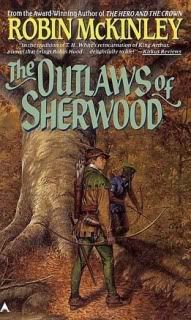
(I’d really like to know what Robin’s looking at, seeing as how the other guy seems to be looking at something a lot more dangerous.)
PLOT - Robin, the poor forester son of a poor forester, is on his way to the fair, hoping to enter the archery contest. But trouble comes in the form of a HOODLUM. This HOODLUM got the assistant (to the) chief forester job, and he’s feelin’ like hot shit. So he and his HOODLUM (Okay, I’ll stop) friends commence to razzing Robin about what a crap archer he is and he flips out and kills them. I’m just kidding. He only kills one of them (The chief HOO… I mean RASCAL), and it’s an accident. He means to just spook the guy and figures the arrow won’t even reach him, but he even sucks at sucking and it hit’s the poor bastard right in the heart. This is the closest we’ve come yet to the oldest Robin Hood origin, except that in that, he actually does kill the guy for no real reason. Any old how, Robin naturally goes on the lam after this , living in his friend Much’s attic for a time, until he decided to run off to the woods. Much joins him, and brings a few other folks on the wrong side of the law along. And Robin’s all “Dude! How do I effectively hide in the forest with all these people here?” and Much is all “Duh. You become a freedom fighter and symbol of hope to the oppressed Saxons.” and Robin’s all “Nuh-UH! Not even!” and Much is all “Well, what the hell else are you gonna do?”
So Robin lives in the woods happily ever after. FACE! He actually starts taking in all sorts of other refugees from the sheriff, stealing food and whatnot, and finding homes for them in other villages. But, as Much realizes, if you’re stealing food, why not also steal some ill-gotten money already? Spread that around, you’re hurting the man and helping the poor. Anyway, things escalate from there in the usual way. After a while the Sheriff decides that’s quite enough of this nonsense thank you so much, and hires a badass from out of town to take down the Hood gang in the most stunningly violent episode of any Robin Hood I’ve seen or read. Not bad for a “young adult” book.
(This man purports to be the cover model for the book. And since he signs my paychecks, I have no reason to disbelieve him.)
THE GOOD - In a book, they get to spend more time on each individual part of the story, which is nice. For example, the bridge fight between Robin Hood and Little John. In the average movie, they bump into each other, have a brief tiff about who gets to cross, and fight. In this book, we get details like Robin was in a bad mood in the first place and therefore not paying attention, John was a quarter of the way across when Robin started, and stopped to watch him. Thus John was there first, but Robin was farther, giving them both a legitimate claim to pass. (I also like that John stays where he is when Robin walks back to the other side and spends five minutes or so cutting himself a staff.) There’s also a lot more freedom to go into subplots, which is nice, even if said subplots are occasionally kind of lame.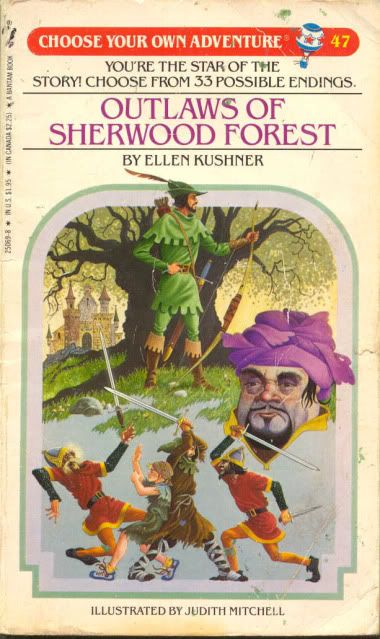
(I am not reviewing this book. But if anyone has a copy, I REALLY REALLY want it.) THE BAD - The subplots are, for the most part, incredibly lame. Lots of business about Marian’s wooing and Will’s sister and other stuff of no interest to the main story. And while the time they can take to tell the story is good, there’s about seventy pages here and there that could be snipped without much loss to the book in general. The part where Marian is injured and Little John has to sneak her off to Tuck’s place in the company of some circus folk is particularly draggy. On the other hand, the book does have circus folk, which is an improvement on most versions of the tale.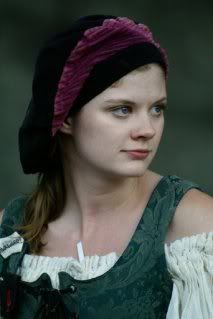
(Beth, I swear I will return this book to you soon. And after only two years! Less, even!)
THE OTHERWISE WORTHY OF MENTION - The characters all talk in a semi-formalistic and extremely wordy manner that almost always works wonderfully by making it sound old-fashioned without using a load of thees and thous. But sometimes there are moments where it gets jarring/obnoxious, particularly when used in the narration. Oh, and they say ‘sennight’ a lot. Just say ‘week,’ you jackasses. Another side effect is the fact that a lot of parts wind up being pretty hilarious out of context.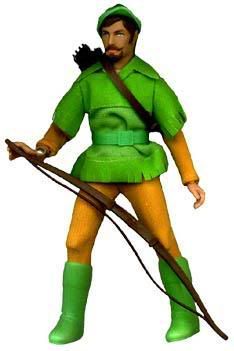
(Ah, the Mego company. They pretty much held the monopoly on action figures in the '70s. But how far they fall... Well, I'll show you later.)
ROBIN - I like this one, because the major facet of his personality is that he sucks. He is a terrible archer, the worst in the band. In fact, his sucking at archery is what gets him outlawed in the first place. He has a tendency to get mopey and introspective, and would rather ensure the safety of his men than steal from anyone. So when he does go out a-robbing, he’s doing it thoughtfully and seriously. His mopeyness is actually what gives him his outlaw name, even. It’s raining, and Robin’s pouting, and Much is trying to convince him to start calling himself Sheriff-Bane, and Robin flips his hood up and says “Might as well be Robin-of-the-Hood. It’s rains enough here, God knows.” Then Lucy pulls the football away from him and he sighs over the little red-haired girl. No, seriously… I mean in sooth, he takes his life as it comes, and it actually makes him one of my favorite Robins. Oh, and they make reference to the fact that he can’t grow a decent beard. I feel you, man.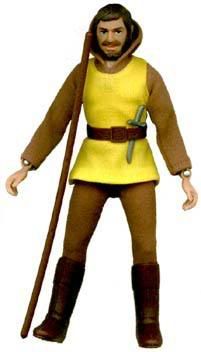
(The weird thing is he's no taller than Robin, since they just made one body and stuck different heads on them.)
LITTLE JOHN - Someone’s got a crush on Little John, and her name is Robin McKinley. I have learned, in what passes for research here at the Brian Lynch Academy of Lazy Blogging, that McKinley’s husband is several years her senior, and that nearly every one of her books features a female protagonist that falls in love with an older man. Now, there’s no option for that sort of shenannigation here, unless we want to make some very serious changes to the legend, but McK makes up for it by spending luxurious paragraphs on John’s beard and his serious, wise attitude, and how he’s best at most stuff, etcetera. It comes to a really creepy head when he has to go to a fair posing as a wrestler, donning tight pants and oiling up his muscles.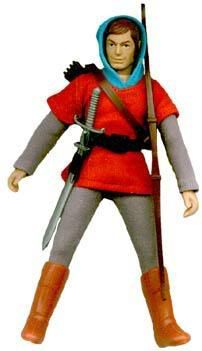
(Mego Will adds even more to the characters traditional lack of camouflage with a snappy blue hood.)
WILL SCARLET - Will is the second tallest guy in the band. He’s almost as tall and muscular as Little John. And that’s clearly important, because it’s brought up like once a chapter. Even when he’s not around. His motivations for joining the band are odd. He’s a rich man’s son, and when his beloved sister is given in marriage to a Norman, he heads off to find Robin Hood. Not to rescue his sister, as a sensible person with a reasonable grasp of narrative causality would assume. He’s just sort of given up on her. Real class act. Anyway, after joining the band, he quickly settles into the standard Will Scarlet role of third banana and hardly any personality. Hooray!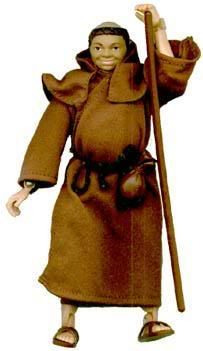
(I like his sandals and his cottonball under the tunic padding, but what's with the creepy grin?)
TUCK - Jesus, what a sad sack. He lives in a crappy little yurt in the middle of the woods with three huge dogs named Beauty, Bright Eyes, and I forget the last, so I’m gonna guess Henslowe. It’s probably Henslowe. Anyway, Tuck never joins the band proper, just sort of hangs around on the outskirts moping, lending a hand when someone needs medical help or needs to get married or whatever. His clothes are crappy, he’s old and fat, and the big final battle with Guy takes place at his place and Henslowe gets killed. Kinda depressing here.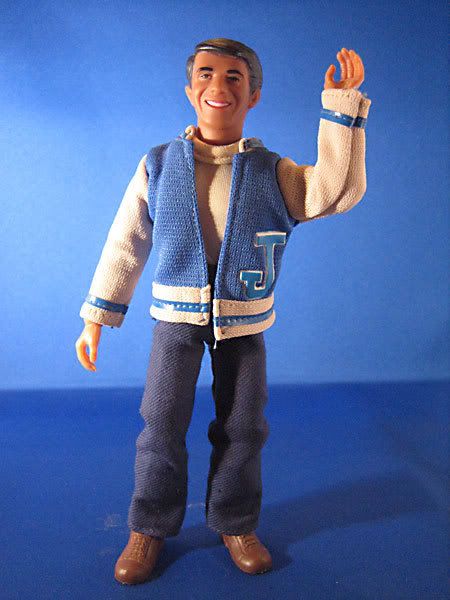
(What, you didn't actually think they made a Much figure, did you?)
MUCH - Second good Much in a row. Yikes. The last one was not annoying, this one takes it a step further by being smart. We keep this up, the next one’s gonna have to be a capable fighter. Well, let’s not go nuts. But yeah, Much is the one who convinces Robin to go from being an outlaw to being an Outlaw. His basic point is that the people need a hero, and you’re a dead man walking anyway, so you might as well be one. For the rest of the book, he’s the morale booster and resident snarker, good for spotting flaws in plans, and keeping everyone inspired with his enthusiasm for madcap superheroics. He’s kind of like Marco from Animorphs that way. Hey, I keep my references classy here.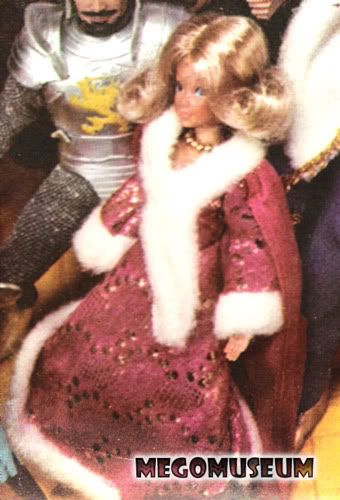
(Sure she's poorly constructed and her only accessory was probably a hairbrush, but any Mego female was made in such low numbers she's probably worth about five thousand dollars today.)
MARIAN - She’s Robin’s childhood friend in this. The hoops McKinley jumps through to have the poor forester be friends with the rich dude’s daughter are contrived, but in a way that you juuuuuust barely manage to not care about. She helps convince Robin to be a hero, and helps with getting supplies and clothes for everyone in the early days. She also gets a lot of private attention. Probably because this was written by a lady, said the sexist blogger. In addition to the standard “Oh I love Robin so much, but he leads the hard life of an outlaw,” we are treated to an interminable subplot about her wooing at the hands of a dweeby little twerp called Nigel. There are whole chapters wasted on whether she’s going to choose the sniveling pencil pusher over the childhood sweetheart/superhero. Gee, what do you think?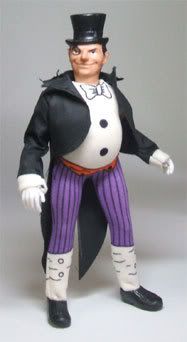
(Even before I decided to use toys for this review, I pictured him pretty much like The Penguin. I know, it's weird.)
SHERIFF - Fun stuff with the Sheriff, though he’s barely in this one at all. The book takes the position that Robin and the gang are more like a nuisance to the powerful and important Sheriff than anything really bad. After all, they’re small potatoes in the grand scheme of things. It’s only after they prevent him from taking some land by paying off a mortgage with money stolen from his coffers (their first big job) that he really gets his knightly knickers in a knot. And then his whole business model is pretty much the standard “Hire more foresters, hunters, and soldiers of increasingly poor skill until I get REALLY mad and decide to hire…”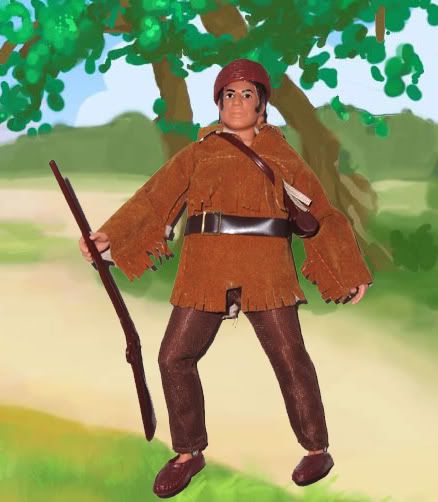
(Gisbourne! Guyyyyy of Gisbourne! King of the wild frontier!)
SIR GUY - The classic Guy shows up at last! See, Sir Guy wasn’t always “Sir“. In fact, I believe Sir Tons du Fun from the silent masterpiece was the first to carry the knightly title, but like I said, I barely do any research. In ye olde ballads, however, Guy was a drooling mercenary who showed up in the woods wearing most of a horse, and Robin beheaded him and stole his pants. He is introduced as a bounty hunter whose reputation strikes fear into the hearts of all who hear his name. Like Boba Fett. When he strikes, he is swift, capable, effective, and deadly. Like the opposite of Boba Fett.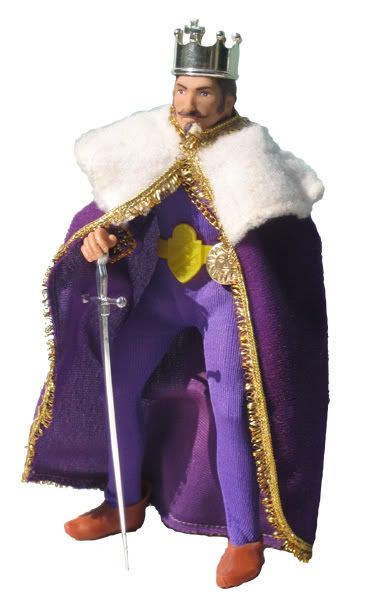
(Even in mustache and unitard, he's still less creepy than the Burger King.)
THE MAN - I don’t remember if John played a part in this at all. If he did, it wasn‘t important. I think they mentioned how he speaks better English than his brother or something. But that brother sure played a part. Ol’ Couer de Leon shows up at the end, like he usually does. Only, you know how usually when he shows up at the end, it’s to bestow some marriages, punish the wicked, and pay for Sean Connery’s new boat? This is kind of like that, except he shows up to depress the fuck out of everyone and be a jerk. And I can see his point for acting the way he does. On the one hand, sure, Robin saved a lot of innocent, not to mention loyal subjects. But on the other hand, he did this by stealing the King’s taxes and flouting the law. So what’s his punishment to be? A term of service in the Jerusalem. Oh, great. So unlike every other Robin Hood thing, where he comes back from the Holy Land, stops the Sheriff, and gets the girl; here he gets the girl, stops the Sheriff, and leaves for the Holy Land. Where the hell does McKinley live? BACKWARDS TOWN? For the record, it’s not just Robin who gets bent over like Berengaria. The others… What? Spellcheck doesn’t recognize blog, snark, Boba, dweeby, kinda, gonna, or spellcheck, but it’s fine with Berengaria? Huh. Anyway, the others are all shipped off, too. And I mean all. The women go along as cooks, except for Marian and one other, who will be soldiers; and Alan and Much, who were crippled in the fight with Guy, (Alan will never play again, of course. McKinley seems to subscribe to the Joss Whedon school of do horrible things to your supporting cast.) go along as scribe and quartermaster, respectively. (I should add that the ending is not free of all happiness. Robin and Marian are together after all, and Robin is made heir to the lands he saved from the Sheriff. It is also not free of girl-powery contrivance; as Marian goes as a soldier after turning down a job as new Sheriff.) So anyway, the King’s kind of a jerk, but he tries in his own jerky way to give the happiest ending his stupid, jerky king brain knows how.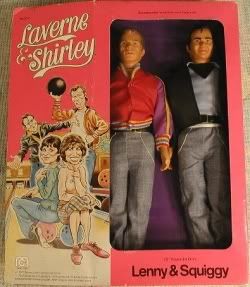
(Sure, why not?)
OTHER MERRY MEN - Well, there’s Jocelyn, who against all probability is a man. And then there's Rafe, which is how Ralph Feinnes would spell his name if he paid attention in English class. They’re one of a few random names that show up every so often, just enough to give you a sense of the main characters actually knowing who everyone else in the woods is, and avoid a situation like Lost where every important thing happens to a core group and everyone else just sort of hangs out. Speaking of the core group, Alan-a-Dale gets his I’m-not-legendary-but-I’m-damn-close on in this book. They tie together two classic legends, using the breakup of Alan’s love’s wedding to a knight to rob from said knight, and use his money to pay the mortgage of Sir Richard at the Lee. (Who if I’ve never mentioned him before, is Robin’s foremost noble supporter in the old tales, and was Marion’s father in Robin of Sherwood.) Alan reacts to the outlaw life with enthusiasm that far surpasses his ability, and his wife reacts with enthusiasm that equals her ability, which is to say none.
(OBSCURE JOKE!)
OMG SPOILERS YOU GUYS - At one point, a boy named Cecil joins the gang. He kind of sucks at everything, doesn’t talk much, and is nervous around the ladies. But he’s small, sneaky, keen, and his self-haircut is adorable, so Little John takes the lad under his wing and trains him. And he seems to really like being under John’s wing… a little too much. Just when it seems we’re about to bust through with some more of the Robin Hood legend’s signature “Not that there’s anything wrong with that,” Cecil is revealed to be Cecily, Will’s little sister! She didn’t marry that Norman after all! Which Will would know if he ever called or anything. Anyway, Cecily insists on continuing her training, and after this point, the book has a depressing tendency to turn into Cecily Presents the Cecily Show Starring Cecily. In Cecily, McKinley finds herself more in her element, writing about a young lady committing daring acts while mooning over an older man, and it’s all nicely done, but the absolute shift in main character is shocking. It’s one thing to spend the occasional chapter following Marian around, but quite another thing to have Robin disappear from the book entirely for five chapters.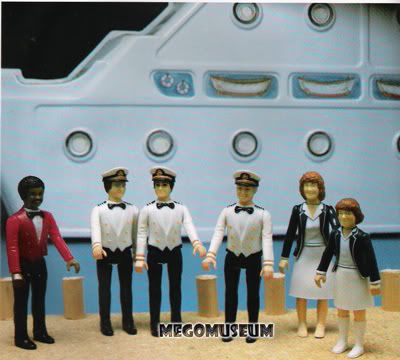
(THIS is how far they fell. Love Boat action figures.)
OTHER VILLAINS - None, really. The villains aren’t really the focus, and other than the Sheriff’s weaselly friend and the guy who’s trying to marry Alan’s girl, there’s not really anything to speak of. And they’re boring. Guy’s henchmen and the Sheriff’s foresters get no personality, and I’ve already said all there is to say about the HOOLIGANS.
(Cavort, cavort, cavort, cavort...)
AND NOW, SOME HILARIOUS OUT OF CONTEXT LINES -
“What a disappointment,” Much said, “For mine is the shortest in the company.”
“Here, you’ll have more use for this,” said Tuck, and thrust the sticky knob at Rafe.
“She does it obliquely.”
“I find,” Cecil said sheepishly, “That I miss sausages.”
COMING UP NEXT - Hey, who wants to finally read about that Star Trek episode? I hope you do, because otherwise, you’re gonna be disappointed.
Sarah J.